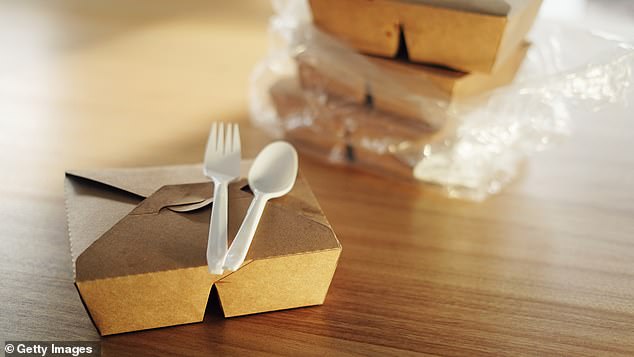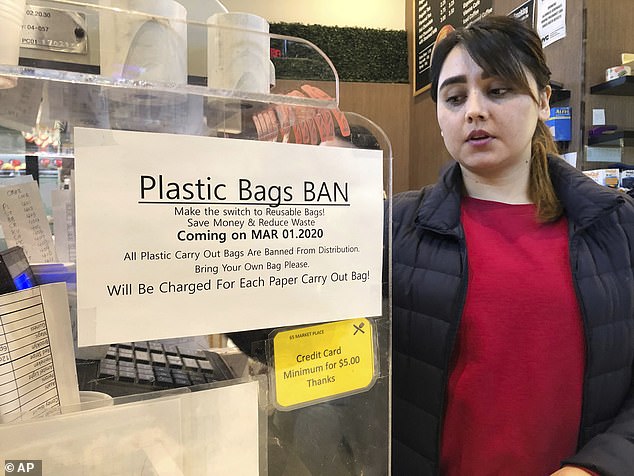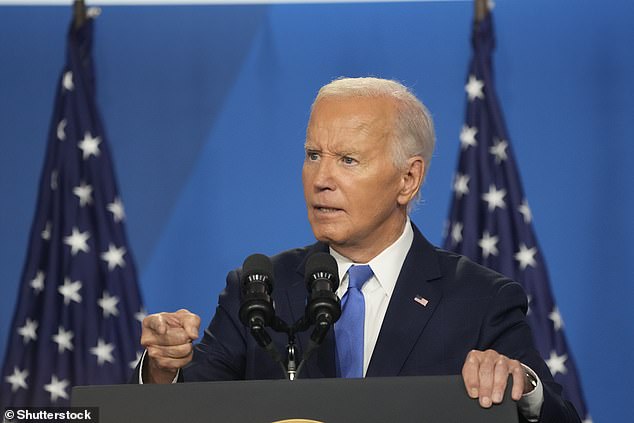Republicans are outraged that the Biden administration is focusing its efforts on banning single-use plastic utensils while wars rage and “the world is on fire.”
Earlier this month, the White House announced a plan to phase out single-use plastics in government facilities.
The plan will also add stricter regulations for plastic manufacturers in the United States, the administration said.
The “ridiculous” measure will “raise costs” and hurt U.S. plastic suppliers, Republicans say, calling the effort absurd and likely to backfire.
“The world is on fire and he’s worried about plastic forks,” Sen. Mike Rounds, R-S.D., told DailyMail.com, adding that such a policy is “business as usual” for the administration.
President Joe Biden’s administration announced a plan for the U.S. government to phase out single-use plastic purchases. The directive will force government sites, such as military bases, to find alternatives for plastic utensils and other single-use products.

Biden administration plan seeks to ban single-use plastic purchases by 2027
“Look, I fully understand that plastics are pollutants and that we need to do a better job of managing them,” Rounds continued. “But I’m a little hesitant to say that this plastic ban will be a positive thing.”
‘Black and white mandates like this are often counterproductive. I think there are things we can do as a government and as individuals to continue to improve our environment.’
Sen. Roger Wicker, R-Mississippi, told DailyMail.com that Biden’s effort is “absurd” and “ridiculous.”
“The first thing I want to say is, what’s wrong with plastic forks and spoons? I’m guessing the biggest impact this will have is in government workplaces, military bases and places like that,” said Sen. Mike Lee, R-Utah.
‘Does that mean they’ll have to have, for example, stainless steel cutlery everywhere, with lots of people washing dishes, and what about people who need things to take away?’
He said the effort to phase out single-use plastics is misplaced, and that if the White House wants to significantly reduce waste, it should downsize government, the consumer, rather than ban plastic, the product consumed.
“They should reduce the size of government if they want it to be less of a consumer. The reason it’s the biggest consumer is because it employs so many people and does so many things that it was probably never intended to do.”
“So if they want to reduce the environmental impact of the U.S. government, they should downsize the government.”
Lee continued: “Now, I hope this is not a step towards banning it, like a public ban of general applicability.”
Sen. Lindsey Graham, R-S.C., said solving plastic pollution in the world’s oceans is an urgent problem, but expressed skepticism about the ban.
“I would like to tackle the problem of plastics in the oceans, but I’m not so sure that this is the solution,” he told DailyMail.com.

The ban would affect federal cafeterias like those on Capitol Hill, shown above during a pro-Gaza protest in April 2024.

New administration plan seeks to ban plastic utensils in government facilities

A cash register clerk looks at a sign reading “Plastic Bag Ban” at a grocery store in New York on Wednesday, Feb. 26, 2020. Many types of plastic bags will be banned starting March 1, 2020 in New York State in an effort to reduce pollution.
The plan’s centerpiece is to phase out federally purchased single-use plastics for food, packaging and events by 2027.
The goal is to eliminate all single-use plastics from federal operations by 2035.
“It’s more messaging and ridiculousness, and it’s a direct attack on that entire industry,” Sen. James Lankford, R-Okla., told DailyMail.com exclusively.
“It’s clearly not something that affects everyone. It’s going to increase costs for a lot of people, so it seems irrelevant to deficit issues.”
Lankford, who served in the House from 2011 to 2015, recalled an earlier attempt to ban plastic tableware on Capitol Hill, noting how efforts to ban the products are typically overturned by new administrations.
The controversial move to ban plastic spoons, forks and other utensils first outraged Republicans years ago, when former Speaker Nancy Pelosi first banned them in 2007.
Once Republicans regained control of the House in late 2011, they scrapped the deal, citing the nearly half-million dollar expense of transporting compostable utensils.

Former House Speaker Nancy Pelosi banned plastic utensils in the U.S. Capitol from 2007 to 2011 before Republicans took power and repealed the rule, Sen. Lankford said.

Military bases would also be affected by the ruling, Senator Mike Lee speculated.
“We’ve been through that here on Capitol Hill, as you know, when Speaker Pelosi said we were going to have digestible silverware everywhere, and everyone went crazy about that, until they started using it to realize they were eating the spoon too and it didn’t taste good,” Lankford said of Pelosi’s 2007 “Green the Capitol” initiative.
Pelosi’s plan introduced biodegradable utensils on Capitol Hill before being repealed by Republicans in 2011.
Styrofoam cups and plastic forks returned to Capitol Hill cafeterias once the Republican Party, led by former Speaker John Boehner, regained control of the chamber.

